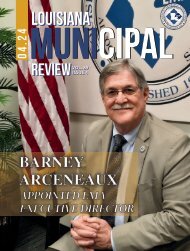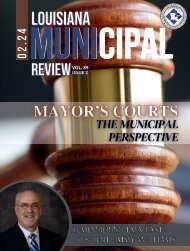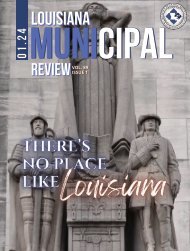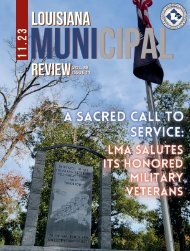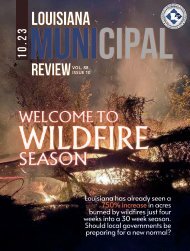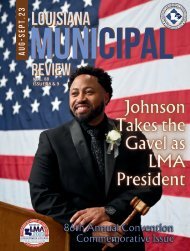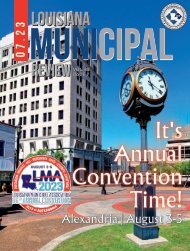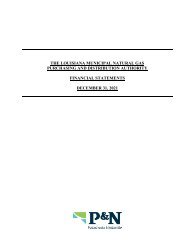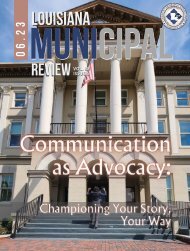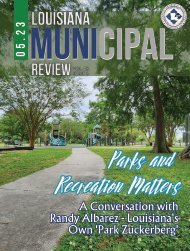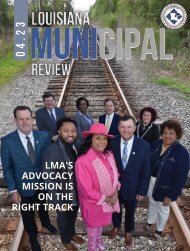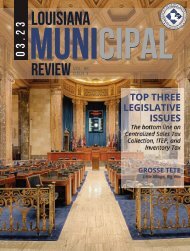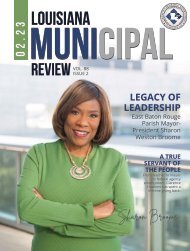LMR JULY 2020
July 2020 Louisiana Municipal Review
July 2020 Louisiana Municipal Review
You also want an ePaper? Increase the reach of your titles
YUMPU automatically turns print PDFs into web optimized ePapers that Google loves.
Louisiana Municipal Review
PUBLISHED BY THE LOUISIANA MUNICIPAL ASSOCIATION
VOL 85, NO. 7
JULY 2020
LPS NEGOTIATES
AFFORDABLE PRICING
FOR OUTDOOR PUBLIC
INFRASTRUCTURE
INCLUDING PLAYGROUNDS,
LIGHTING AND FLAG POLES.
USE YOUR
SMARTPHONE
CAMERA TO
VISIT LPS &
CONTACT US
FOR MORE
INFO!
FLY FLAGS
WITH PRIDE
IN PARKS &
OTHER PUBLIC
SPACES!
LET LAMATS
KEEP COSTS
DOWN &
OLD GLORY
FLYING HIGH
The Louisiana Municipal Review, the official publication of the Louisiana Municipal Association, serves as a medium for the exchange
of ideas and information for municipal officials in Louisiana. With a circulation of over 3,200, this publication is read by employees of
Louisiana municipal governments, sheriffs, parish presidents, state government officials, and members of the state legislature and
Congressional delegation, among others. Subscription rate: $24 per year; Single copy: $2. Louisiana residents, add 9% sales tax. Rates
for display, professional-listing, and classified advertising available upon request at editor@lma.org.
Statements or expressions of opinions appearing herein are those of the authors and not necessarily those of the Louisiana Municipal
Association. Publication of any advertisement shall not be considered an endorsement of the product or service involved. No material
from this publication may be reprinted without the express permission of the editor.
Editorial offices: Louisiana Municipal Association, 700 North 10th Street, Suite 400, Post Office Box 4327, Baton Rouge, LA 70821-
4327, editor@lma.org, www.lma.org, (225) 344-5001, (800) 234-8274, FAX (225) 344-3057.
MUNICIPAL REVIEW STAFF
Executive Director: John Gallagher jgallagher@lma.org
Managing Editor: Karen Day White kwhite@lma.org
Editor: Anita Tillman atillman@lma.org
Production Coordinator: Baton Rouge Press, Inc.
LOUISIANA MUNICIPAL REVIEW
(USPS 832-560) (ISSN 0164-3622)
3 rd class postage paid at
Baton Rouge, Louisiana.
Postmaster – Send address changes to:
LOUISIANA MUNICIPAL REVIEW
Post Office Box 4327
Baton Rouge, LA 70821-4327
2019-20 LMA EXECUTIVE BOARD (non-affiliate, non-advisory)
President – Jimmy Williams – Mayor, Sibley
District J Vice President – Rodney Grogan, Mayor, Patterson
First Vice President – Michael Chauffe – Mayor, Grosse Tete LMA Past President – Barney Arceneaux, Mayor, Gonzales
Second Vice President– Jennifer Vidrine – Mayor, Ville Platte LMA Past President – Glenn Brasseaux, Mayor, Carencro
Immediate Past President – Harry Lewis – Mayor, Rayville
LMA Past President – David Butler, Mayor, Woodworth
District A Vice President – Peggy Adkins, Mayor, Sarepta
LMA Past President – David Camardelle, Mayor, Grand Isle
District B Vice President – Ronny Walker, Mayor, Ruston
LMA Past President – Clarence Fields, Mayor, Pineville
District C Vice President – Adam Holland, Mayor, Oak Grove
LMA Past President – Norman Heine, Councilman, Baker
District D Vice President – Rick Allen, Mayor, Leesville
Vice President-at-Large - Mark Piazza, Mayor, Abbeville
District E Vice President – Nathan Martin, Councilman, Pineville Vice President-at-Large - Darnell Waites, Mayor, Baker
District F Vice President – Charles James, Mayor, Sunset
Vice President (<1K) - Kevin Colligan, Mayor, Cankton
District G Vice President – Kenneth Stinson, Mayor, Vinton
Vice President (1K – 2.5K) – Johnny Natt, Mayor, Mangham
District H Vice President – David Toups, Mayor, Addis
Vice President (2.5K – 5K) – Robert Hardey, Mayor, Westlake
District I Vice President – Donald Villere, Mayor, Mandeville
Page 2
LMR | JULY 2020
Inside the LMA
Director’s Viewpoint
THE REVITALIZATION OF RURAL LOUISIANA
BY JOHN GALLAGHER, EXECUTIVE DIRECTOR
Rural communities under 5,000 in
population make up roughly 80 percent
of Louisiana’s municipalities.
They are also the centers of commerce
in many rural parishes - where
you shop, receive medical attention, and attend school.
Years ago, many of those municipalities were thriving,
benefitting from solid tax bases and healthy populations.
Sadly, industry trends and economic downturns have created
or contributed to the struggles of many towns and
villages. Once active rural communities now suffer from
population losses, diminished tax bases, and empty main
streets. But one aspect of those rural municipalities has
not changed: community pride. When I have travelled to
these municipalities over my 20+ years at the LMA, I have
witnessed the depth of commitment that municipal leaders
and residents have for their communities. This issue is
dedicated to the revitalization of rural Louisiana and to
the municipal leaders who strive daily to make it a reality.
Conversations about how to address rural decline have
gone on for years. Some state leaders have even advocated
for eliminating small towns as they “serve no purpose.”
The LMA knows that this offensive proposition could not
be farther from the truth and as your Executive Director, I
am tired of hearing it. That is why I am very proud to have
been appointed by Governor Edwards to represent the
LMA on the Governor’s Advisory Council on Rural Revitalization,
which was launched in February. In his introductory
remarks at our first virtual meeting in April, Governor Edwards
emphasized that he does not want this committee’s
report to be another pretty book that sits on a bookshelf;
rather, the council should give dynamic recommendations
to revitalize our rural communities. I thank the Governor
for his commitment to rural Louisiana and applaud
former Senators Ben Nevers and Noble Ellington for their
leadership in chairing this council.
The council supports nine subcommittees to examine various
issues faced by rural areas, ranging from agricultural
challenges to the expansion of broadband to workforce
development. I have been assigned to four of the nine
subcommittees: Economic Development, Infrastructure,
Clean Water, and Finance. Our subcommittees have already
started meeting to discuss these important matters,
but to truly accomplish our goals, I need your input and
will reach out to you for feedback and guidance. Together,
we can accomplish the council’s objective to make rural
Louisiana communities more productive, sustainable,
healthy, and attractive places to live.
The LMA legislative team also supported measures that
boost rural revitalization this year. We are proud to advocate
for measures that enable and encourage the proliferation
of broadband in rural communities, including
SB 10 by Senator Mizell. Through diligence and perseverance,
local government stakeholders were able to secure
both carryover and new funding for local governments
through the Local Government Assistance Program ($14
million total) and the Community Water Enrichment Fund
($9 million total).
While we unfortunately had to cancel the 2020 Annual
LMA Convention, we are dedicated to recognizing the
project successes of our members. We are proud to announce
our 2020 Community Achievement Awards event
sponsored by Government Consultants, Inc., a combined
live and virtual awards ceremony. This year, we have added
a new category, Technology & Connectivity, so I encourage
all members with a qualifying 2019 project to
present their entries now for these prestigious awards.
I also urge you to submit your qualifying reimbursable expenditures
to the Division of Administration to access the
over $550 million in CARES Act funding. Applications for
the second tranche of money will remain open through
July 15, embracing eligible costs expended from March 1
through June 30. Estimates indicate that many municipalities
did not submit applications for reimbursement
during round one, but it is not too late to send all potential
expenses to DOA now by visiting www.louisianacares.
la.gov.
I appreciate your diligence as frontline responders to the
COVID-19 pandemic, and I hope that you are staying safe.
All LMA employees, including our subsidiaries LaMATS
and RMI, are now back on-site full time and we stand
ready to assist you to become the best leader you can be.
LMR | JULY 2020 Page 3
President’s Message
STAYING CONNECTED
BY MAYOR JIMMY WILLIAMS, TOWN OF SIBLEY
As local government leaders, we are
tasked with doing the best we can
with the information that is available
to us at any given point in time and
that is not always easy. The first six
months of this year tested all of us in ways that we never
imagined and through it all, we’ve managed to keep our
municipalities moving in the right direction. Not only am
I grateful for the frontline workers and local government
employees across the state who continue to ensure
continuity of operations, I am also very proud of the
staff at LMA who transitioned from the office to remote
work without missing a beat. They kept us informed and
on mission through virtual meetings, conference calls,
emails and resources on the LMA website and are to be
commended for adapting so quickly.
The summer months are usually filled with fairs, festivals
and outdoor sports. This year we find ourselves with
much less of a social calendar and much more social
distancing. With such a drastic decrease in human
interaction, many of our neighbors may be feeling
isolated or lonely. I want to encourage us as leaders to
find ways to keep our communities connected. How can
we safely partner with nursing homes to bring some
much needed joy to residents who are missing their
family members? How can we engage our youth who
are missing their usual summer camps and gatherings
with friends? How can we show honor and appreciation
for not only the frontline medical workers and first
responders, but also the people who work in retail stores,
restaurants, custodial services, grocery stores and so
many others who have kept our basic needs met during
this pandemic? They have been on the frontlines and
they are essential too. We must be creative and find
new and different ways to support the members of our
community who especially now, may feel disconnected,
undervalued, and underappreciated. I would love to hear
your ideas and suggestions. Send an email to editor@
lma.org and tell us what you are doing in your town.
Supporting and celebrating each other now is more
important than ever and I am excited about the
opportunity to recognize the achievements of our
cities, towns and villages through this year’s prestigious
Community Achievement Awards. If this season has
taught us anything, we now know that we can not only
think outside the box, but that doing things differently
is perfectly fine. The Community Achievement Awards
have always been part of the Annual Convention, but
since the convention was cancelled, the LMA staff put
their heads together to ensure that the awards will live
on. We are also excited to continue with the annual
Service Awards where we recognize our members for
multiple years of public service.
While we are making sure to meet the needs of others,
let’s not forget about ourselves. It’s summertime and
although our vacation plans probably won’t look like
they typically have, don’t let that deter you from some
overdue relaxation. Take a road trip and enjoy going to
a place in Louisiana you’ve never seen before. Enjoy a
day or even a staycation at one of our beautiful, scenic
state parks. Get out and soak up the sun and feel the
breeze on a morning stroll or an evening bike ride. These
unprecedented times can be stressful, so we have to
make sure to give ourselves room to breathe, relax, and
recharge. The first half of the year has put many things
into perspective, including how important it is for us to
stay mentally and physically strong. Let’s continue to
do everything in our power to preserve the health and
safety of our communities, our families, and ourselves.
Stay hydrated, stay safe, and enjoy your Summer!
Amendments to the
LMA Bylaws are due August 3
LMA members are encouraged to review the LMA Bylaws
and consider amending them for the betterment of the
Association. If a LMA member is interested in proposing an
amendment, they must follow the proper procedures.
Article 17 of the LMA Constitution states that it “may be
amended at any meeting of the Association by a vote of at
least two-thirds of the municipal corporations present, provided
such amendment has been submitted in writing to the
Executive Director at least 30 days prior to the date of the
meeting. It shall be the duty of that officer to immediately
notify the Executive Board of the proposed amendment.”
Therefore, any amendment(s) proposed by a municipality for
consideration by the LMA membership must be in writing
and received by the LMA office no later than 5:00 p.m. Monday,
August 3rd, and sent to:
Executive Director John Gallagher
Louisiana Municipal Association
P.O. Box 4327
Baton Rouge, LA 70821-4327
Page 4
LMR | JULY 2020
Inside the LMA
Governor’s Column
RISING TO THE CHALLENGE – JULY 2020
BY JOHN BEL EDWARDS, GOVERNOR OF LOUISIANA
July is here and it feels as if time is
moving by quickly. We’ve suffered
many losses and had to make many
adjustments this year because
of COVID-19, but as a result of your leadership, our
state has made strides in flattening the curve and
preventing our hospitals from becoming overwhelmed.
I’m grateful for all that you have done and continue to
do. With more businesses operating and more people
out and about, we must be mindful that COVID-19
is still here. Mitigation efforts are important. Social
distancing, wearing masks or facial coverings and
frequent hand washing are necessary to staying as
safe as possible.
Safety is key when it comes to revitalizing our rural
communities, which remains a top priority for my
administration. Partnering with the Louisiana Municipal
Association is vital to the process, and having
John Gallagher as a Executive Director has been
invaluable. I’m especially proud of the work by the
Rural Revitalization Council (RRC) as members quickly
responded to the needs of communities impacted by
COVID-19. One major issue that we have been working
on has certainly been heightened by the pandemic
and that is the lack of internet connectivity for many
of our rural communities. This must be resolved
and through work by the RRC, LMA and Louisiana’s
Broadband for Everyone in
Louisiana Commission (BEL),
I’m confident that will happen.
In addition, the RRC is working
on achieving its original
mandate to reenergize rural
Louisiana through systemic
improvements in key areas:
economic development,
education, healthcare,
infrastructure, clean water,
agriculture, workforce
development, and broadband.
As the council enters phase
two of its strategic planning
roadmap, it will begin by
identifying challenges. The
council will conduct research to
understand the current needs
as well as reach out to rural communities to assess
and prioritize current challenges. Focus groups will
meet with state agencies, businesses, nonprofits, and
academic institutions to better understand stakeholder
perspectives. The RRC will use that data to develop a
series of policy recommendations to advance each of
the key areas.
As a reminder, we are now in the 2020 Hurricane
Season, and it’s important to make sure that everyone
has a game plan in place. There has already been lots
of activity and storms, named or not, can cause major
damage. The Governor’s Office of Homeland Security
and Emergency Preparedness stands at the ready to
offer assistance. And given COVID-19, our emergency
supply kits must include the traditional items but also
masks/facial coverings and hand sanitizer. It’s a new
way of thinking and living. GetAGamePlan.org is a great
resource for everyone.
Speaking of everyone, this year, we have a great
opportunity to shape Louisiana’s future by filling
out the 2020 Census. Please encourage all of our
constituents to take a few minutes to fill out the
form online at MyCensus2020.Gov. It will determine
Louisiana’s share of more than $675 billion dollars in
federal funding for things like: first responders, school
meals, Medicare and Medicaid, libraries and community
centers. It will help determine
our representation in Congress
and state legislative and
congressional districts.
Everyone in Louisiana counts
but right now, we rank 44th in
the nation in participation and
we are last in the Deep South.
This opportunity only happens
once every 10 years. A few
minutes of time can make a
huge difference over time.
I hope everyone had a safe and
happy July 4th. Be proud of
the work that you do to make
our communities the best
they can be. What a privilege
we all have to represent such
incredible and resilient people.
Thank you and God bless.
LMR | JULY 2020 Page 5
Gov. Edwards Issues Order Keeping Louisiana in
Phase Two, Encourages Louisianans to Mask Up
On June 25, Gov. John Bel Edwards formally extended
Phase Two of reopening in Louisiana for another 28
days, as new COVID-19 cases and hospitalizations
increase across the state. The new order leaves in
place occupancy and other restrictions of the previous
Phase Two order and adds a crowd size limit of 250 to
indoor gatherings.
Since late-June, Louisiana has seen a steady uptick
in new positives. More than 3,200 Louisianans have
died from complications of COVID-19. Louisiana has
also pushed to increase testing, having exceeded its
goal of 200,000 tests for the month of June. Louisiana
completed 257,535 tests in the month of June.
“We have watched with concern as cases continue
to rise in Louisiana, which is why we are pausing the
state in Phase Two for now. Data from the last three
days makes it crystal clear that Louisiana is not ready
to move to Phase Three just yet,” Gov. Edwards said.
“Our plan is to watch the daily trends and then to
do another deep dive into the data in 14 days to
determine if things are improving or getting worse, so
we can make a plan for our future. None of us wants to
go back to a time of greater restrictions, which is why
it is incredibly important that all Louisianans take the
necessary mitigation measures to slow the spread of
COVID-19 in the state, including wearing cloth masks
or face coverings when they are in public, staying
home if you are sick or experiencing symptoms,
keeping six feet of social distance and washing their
hands frequently.”
“Some in Louisiana may be done with COVID, but
I promise you that COVID is not yet done with
Louisiana,” Gov. Edwards said. “I especially want to call
on the young people of our state, those ages 18 to
29, to take this illness seriously. This is the age group
with the largest numbers of new cases and while you
may think you are invincible; you are not. Moreover,
you should make sure you don’t spread the illness to
others, especially those most vulnerable to it.”
Go to gov.louisiana.gov to read the Governor’s order,
which extends Phase Two and puts in place a limit of
250 people for the size of indoor gatherings.
FOR MORE INFORMATION:
Business and faith leaders can visit OpenSafely.
la.gov to receive guidance and updates from the State
Fire Marshal’s Office and the Louisiana Department of
Health. Businesses that require approval of reopening
plans will be notified by the State Fire Marshal’s Office
or the Louisiana Department of Health.
• For a guide listing businesses that can be open at
any given time, visit gov.louisiana.gov/page/can-thisbusiness-open.
• Members of the public can continue to
get information from the Governor’s Office
by visiting Coronavirus.la.gov and by texting LAGOV to
67283.
• Members of the public can continue to get
information from the Department of Health by
visiting ldh.la.gov/coronavirus.
• People with general questions about COVID-19 in
Louisiana can call 211.
Before digging, call 811
at least two full work days in advance.
That’s all it takes to notify Louisiana 811
members, so they can mark nearby utility
lines and pipelines to prevent injury and
costly accidents.
IT’S THE LAW. IT’S FREE.
Call or click www.Louisiana811.com
Page 6
LMR | JULY 2020
Inside the LMA
Bossier: 1
Ouachita: 2
Tensas: 1
Avoyelles: 1
Rapides: 1
Lafayette: 2
Calcasieu: 1
Baton Rouge: 10
Tangipahoa: 1
New Orleans: 1
Mississippi: 1
• Potable and Wastewater Treatment
• LDH Certified Operator Training
• LDH Certified Management Training
• LDH Certified, Licensed Operator Staffing
• LDH Certified, Licensed Management
• Long, Short and Emergency Staffing/Management
• Administrative Order and Compliance Assistance
• Certified Lab Testing and Compliance Sampling
www.tmbwater.com (800) 762-9104
LMR | JULY 2020 Page 7
Legal Briefs
A BIG SUMMER FOR SCOTUS
BY KAREN DAY WHITE, EXECUTIVE COUNSEL
Despite the on-going pandemic, the
US Supreme Court tackled some pretty
weighty issues over its summer term,
some of which were addressed (for
now) by the simple refusal of SCOTUS
to hear certain matters.
In a 6-3 decision in Bostock v. Clayton County, the court
held that gay and transgender employees may sue their
employers under Title VII of the Civil Rights Act for discriminating
against them because of their sexual orientation
or gender identity. This replaces a patchwork of state
laws that did or did not allow such discrimination claims.
Following a fascinating analysis of the term “sex” in relation
to Title VII, the court developed a common sense bottom
line articulated by Justice Gorsuch in the majority opinion:
“ . . . if changing the employee’s sex would have yielded a
different choice by the employer—a statutory violation
has occurred.” In other words, the preferences and feelings
of the person are only offensive to the employer because
of that person’s sex.
Justices Alito, Thomas, and Kavanaugh dissented in two
separate opinions, arguing that it is Congress’ duty to
amend Title VII to include these protections, that such
is a legislative function and not the responsibility of the
judiciary.
With SCOTUS refusing to hear thousands of cases each
year, it is not often that the refusal to hear a matter is big
news. But this year, it is.
In total, the court denied nine petitions involving qualified
immunity for law enforcement officers, a topic that has
become increasingly prominent in our national dialogue
since the death of George Floyd. Since the 1960s, the
doctrine of qualified immunity has protected police officers
from individual liability unless the officer violated a
clearly established constitutional right. It is essentially an
examination of the officer’s actions as reasonable or not
based on what he knew at the time. If qualified immunity
applies, then money damages are not available; if qualified
immunity does not apply, then, while the government
employee may technically be responsible for money
damages, the government entity virtually always pays. So,
qualified immunity also protects state and local governments
from having to pay money damages for actions that
are not clear constitutional violations.
By refusing to hear any of the petitions that requested an
alteration or repeal of qualified immunity, SCOTUS made
a clear statement that it is not ready to consider any such
movement at this time. It is likely, however, that they
cannot avoid that discussion for much longer, so the LMA
stands ready to defend qualified immunity through appropriate
state and federal channels.
The court also refused to hear 10 petitions involving guns
that raised a variety of legal issues, but the primary focus
was on the authority of state and local governments to
regulate the possession and carrying of firearms outside
of the home. In 2008 in District of Columbia v. Heller, the
court held that the Second Amendment “guarantee[s] the
individual right to possess and carry weapons in case of
confrontation” within the home. There has been no declaration
from SCOTUS beyond that since.
Justices Thomas and Kavanaugh would have preferred
to take up a case involving a New Jersey law requiring
private citizens to demonstrate a justifiable need to carry a
handgun outside the home. Justice Thomas opined: “This
Court would almost certainly review the constitutionality
of a law requiring citizens to establish a justifiable need
before exercising their free speech rights. And it seems
highly unlikely that the Court would allow a State to
enforce a law requiring a woman to provide a justifiable
need before seeking an abortion. But today, faced with
a petition challenging just such a restriction on citizens’
Second Amendment rights, the Court simply looks the
other way.” The LMA has long advocated that the best
persons to make decisions about firearm zoning are local
officials who know their community’s needs, sensitivities,
and preferences. For now, we must wait on the highest
court to determine when it will provide any guidance or
mandates in this arena.
Page 8
LMR | JULY 2020
Inside the LMA
Community Achievement Awards
We are excited to announce that the annual Louisiana Municipal
Association Community Achievement Awards competition
will continue this year and you are cordially invited to enter this
year’s competition! This year’s competition is made possible
because of the support of our corporate partner and generous
sponsor, Government Consultants, Inc.
Traditionally, the awards were
presented in conjunction with our
annual convention. Unfortunately,
due to the COVID-19 pandemic,
the convention has been
cancelled; however, the awards
competition and ceremony will
still take place.
This prestigious competition
recognizes municipalities for
outstanding projects promoting progress in municipal services
and operations during the 2019 calendar year. The entry form
and rules are available in electronic format on the LMA website
at www.lma.org.
We encourage you to select the most outstanding project
that your municipality began or completed during calendar
year 2019 and complete the entry form for that project.
This year, we have added a new category to the competition
– “Technology and Connectivity.” This new class of projects
is meant to spotlight innovative projects that utilize technological
advancement to improve community quality of life or
promote virtual connection. Entries in this category may include,
but are not limited to, broadband initiatives, websites, image
campaigns, communication programs, and the proliferation of
technology essentials.
This year, we are also embracing a mixed-media event. Winning
entries in each category will be recognized during an exclusive,
live, red carpet event featuring one representative from each
applicant, and the event will be broadcast in real time to virtual
attendees. The date, time, and other details of the award ceremony
will be announced at a later date.
Each municipality may enter only one project per year. There are
four population categories in which your municipality will fall.
Each entry should be within one of these four categories:
Basic Services - Water, sewer, streets, drainage, municipal buildings,
fire, police, emergency services, municipal management,
solid waste management, recycling, communication systems.
Community Development – Public transportation, citizen participation,
public buildings, main street improvements, development
plans, parks and recreation, beautification, promotion of
community projects, strategic planning, cultural enrichment.
Economic Development – Industrial development, industrial
parks, location/expansion of business and/or industries, tourism,
community promotion, workforce development.
Technology & Connectivity – Broadband, marketing, image
campaigns, websites, e-newsletters, local access channels, communication
programs, proliferation of technology essentials.
All Community Achievement Awards applications are to be submitted
by Thursday, August 6, 2020 at 5:00 p.m. These entry forms
can be submitted electronically by email or mailed to the LMA’s
physical address. Faxed entries will not be accepted. Info: Nikki
Samrow, LMA Events Director, nsamrow@lma.org, (225) 344-5001;
LMA Office, Attention: Nikki Samrow, P.O. Box 4327, Baton Rouge,
LA 70821. Please visit www.lma.org or see your mailed packet for
more detailed information about this competition.
LMR | JULY 2020 Page 9
Protecting Communities from Extreme Heat
During the COVID-19 Pandemic
During this unprecedented time, it is important for municipalities
and public health practitioners to work together to keep Louisiana’s
residents and visitors safe. Federal scientists are forecasting that
2020 will be one of the warmest years on record, which means
that state health officials and other decision makers will likely be
responding to COVID-19 and extreme heat events this summer.
Many of the groups that are more susceptible to COVID-19 are also
more likely to develop heat-related illnesses. Because some of the
traditional heat safety recommendations are not feasible or may
contradict the public health protocols established to reduce the
transmission of COVID-19, Louisiana Department of Health (LDH)
wants to collaborate with the members of the Louisiana Municipal
Association to share practical heat safety messages and resources
to keep everyone safe. Contact Emán Williams, LDH Environmental
Public Health Tracking Program’s Health Communications Specialist,
at tracking@la.gov to learn how you can collaborate with the
Department to promote heat safety in your community.
Ad Valorem Property Taxes
Attorney
General’s
Opinions
BY JEFF LANDRY,
ATTORNEY GENERAL
Opinion: 19-0150 Answers various questions related to La.
Const. art. VII, §18(F)(2) regarding the phase-in of increases
of annual property tax assessments under certain circumstances.
Released: 6/5/2020
Page 10
LMR | JULY 2020
A Word from
Our Affiliates
LaMATS/LMA Advocacy Leads to
Improvement in Public Works Process
State Senate Bill No. 118, unanimously passed by Senate
and House chambers in May and signed by Governor
John Bel Edwards on June 10, amends Louisiana’s Title
38 statutes by increasing the spending limit for Small
Public Works contracts from $161,550 to $250,000.
This change, championed by the LMA, provides greater
control and flexibility to municipalities in their completion
of smaller projects by significantly raising the minimum
“contract limit” on labor and materials costs that
require Public Works be put out for bid in the traditional
method of design—bid—build.
Raising the contract limit was one of the recommendations
released in a January report of the State’s Public
Works Contracts Task Force, a stakeholder group established
during the 2019 Regular Legislative Session. Paul
Holmes, LaMATS Purchasing Services consultant, was
tapped by LMA’s Executive Director, John Gallagher, to
be its designee on the Task Force, citing his years of expertise
in public contracts and public works. “The LMA/
LaMATS team had an excellent public bid law professional
in Paul representing the interest of our member municipalities
resulting in a report to the Legislature that
was the driving force for SB 118. We couldn’t be more
pleased with the outcome,” said Gallagher.
The Small Public Works contract limit provides municipalities
more control. “Because public works projects
projected to cost below the contract limit are exempt
from public bid requirements,” explained Holmes, “a
municipality may determine its own solicitation and bid
acceptance process and may, in effect, act as its own
general contractor.” Within the newly expanded spending
limits, “municipalities may enter direct negotiation
with one or more contractors to reach an agreement on
the scope of a project as well as the terms and conditions,”
said Holmes.
“Take a roof replacement on a small public building,” he
suggests. The cost often falls under the statutory contract
limit for public works. “Like a commercial business,”
says Holmes, “the municipality can invite several professional
roofing companies to provide written proposals
for the repair. The municipality may hire based on the
recommended scope of work, quality of materials to be
supplied, company reputation, references and the reasonableness
of cost.” The municipality, like the commercial
business, is not obliged to hire the lowest bidder,
only to assure the bidder can build a roof that won’t leak.
Under a traditional design—bid—build model, on the
other hand, the municipality would have to first hire a
design professional, “spec out” the roof replacement details
(down to the type of fasteners to be used), advertise
the project and evaluate bids, then enter into a formal
public works contract. Ironically, in this model the contractor
is not actually required to produce a sound roof
but merely to produce a roof that matches the specifications.
LaMATS Executive Director Cliff Palmer notes that the
increased flexibility provided by raising the contract
limit for small public works does not exempt municipalities
from due diligence in hiring contractors. “The State’s
Legislative Auditor recommends an RFP-type process
be established and reminds municipalities that fiscal responsibility
and fairness must be incorporated into any
solicitation,” said Palmer.
“LaMATS Purchasing Services can assist with RFPs and
other effective means of securing quotes from qualified
contractors statewide,” continued
Palmer. “Let LPS help
you make the most of this
great new opportunity!”
Use the camera on your
smartphone to scan code and
download full text of SB 118.
LMR | JULY 2020 Page 11
Our national economic
recovery is at risk.
Cities are experiencing cuts that drastically impact not only the people who live and
work in these communities, but also the infrastructure and essential services that are
critical to our national economic recovery.
CITIES ARE PROJECTED TO FACE A
$360 billion
revenue loss over the next
three years
24
states
have yet to announce if they
plan to distribute Federal
Coronavirus Relief Funds to
local governments*
A new survey of 1,100 municipalities from across America shows that the nation’s
economic recovery is at risk of stalling if Congress fails to provide direct federal aid
to cities, towns, and villages.
NEARLY
70%
74%
of cities have not received funding through the CARES Act
of municipalities in the United States have already been
forced to make unavoidable cuts and adjustments
20% 54%
cuts are happening
across the board
targeted cuts
For other cities, towns and villages, it is simply too soon
to know what spending adjustments will be needed
because budgets are still being assessed.
* https://home.treasury.gov/system/files/136/Census-Data-and-Methodology-Final.pdf
Page 12
LMR | JULY 2020
Partner Insight
The Economic Ripple Effect
At a time when streets and public spaces have become essential tools for practicing physical distancing,
65% of cities are being forced to delay or cancel capital expenditures and infrastructure projects.
Without congressional action now, the forced delay or cancellation of infrastructure projects will
create an economic ripple effect throughout the nation not felt in decades.
61%
of cities are delaying or canceling equipment purchases, which will stunt local
commercial activity among businesses that supply equipment for municipal projects.
24%
13%
of cities are making significant cuts to community and economic development
programs, which further hinders local businesses from bouncing back from the
current recession.
are making necessary cuts to code inspection, planning, and
permitting, delaying reopening and the growth of local businesses.
American Workers Will Be Impacted
The potential devastating economic impact of infrastructure project delays and cancellations comes as
32%
of cities indicate they will have to furlough or lay off employees, adding to the
already staggering 1.5 million job losses in the public sector since March.
These workers are more than just a number – they keep your community running.
They’re the lifeguard and the sanitation worker, your neighbors and friends.
41%
of cities have already or will institute a hiring freeze to respond to these fiscal
pressures – making it even harder for these workers to get their jobs back.
It is Not Over
The coronavirus pandemic is not over and cities, towns and villages across the country must continue
to pay the price to keep their residents safe and healthy.
As many states begin to see a resurgence in coronavirus cases, 70% of cities say their most significant
unexpected expenditure has been personal protective equipment and contracting disinfecting
services as public buildings begin to re-open.
These unanticipated expenditures will only continue to rise as municipalities work to address new
spikes in coronavirus cases across the nation.
If Congress does not deliver critical aid to ensure municipalities can
support their local economies, keep their residents safe and their
essential workers on the job, our national economic recovery has the
potential to completely halt.
Methodology: This survey was conducted between June 8-June 16, 2020. A total of 1,117 cities, towns and villages from all 50
states, the District of Columbia and Puerto Rico provided information to NLC.
Learn more www.nlc.org/CitiesAreEssential
LMR | JULY 2020 Page 13
Parish Presidents, LMA, Chambers of Commerce Support
Cassidy’s SMART Act
Louisiana community leaders are urging Congress to pass
a bill written by U.S. Senators Bill Cassidy, M.D. (R-LA) and
Bob Menendez (D-NJ) that supports state and local governments
that have seen their budgets bottom out because of
COVID-19.
Cassidy’s SMART Act creates a fund to assist state and local
governments avoid layoffs of essential workers such as police
officers, firefighters, teachers and sanitation workers. It has
received support from 22 parish presidents, more than 80
mayors and the Louisiana Municipal Association (LMA), and
the Louisiana Chambers of Commerce Executives (LACCE).
“Local community leaders know the challenges facing them in
the COVID-19 recovery. Perhaps the biggest is the budgetary
shortfall created by the economic lockdown. The SMART Act is
necessary to keep local essential workers employed. I appreciate
those on the frontlines for their support,” said Dr. Cassidy.
Treasury Notes
Moving Forward with Virtual Meetings
BY STATE TREASURER JOHN M. SCHRODER
During the pandemic, the State Bond
Commission was the one of the first
state boards to meet virtually. We
quickly discovered virtual meetings
are a great way to get the public engaged
while saving local government time and money.
The State Bond Commission met through Globalmeet
three times. Nearly every time, more than 100 people
participated. It’s amazing what happens when you make it
convenient for people to participate in a public meeting.
Meeting virtually worked so well that we’re continuing it.
Senate Bill 466 by state Sen. Sharon Hewitt allows the
State Bond Commission to hold teleconference meetings
as part of our regular schedule. The governor just signed
the bill into law.
We will have to follow a few guidelines, including providing
a toll-free line for participants and the public. For the most
part, the meetings will work just as they do when we meet
at the State Capitol. The only difference is it won’t matter if
you’re in Shreveport or Delhi rather than in Baton Rouge.
As state treasurer, I serve as chairman of the State Bond
Commission. As a political subdivision, it costs you money
to attend a meeting in Baton Rouge unless you live nearby.
“As elected leaders with parish populations ranging from
over 400,000 to 18,000, the COVID-19 pandemic has created
unprecedented challenges for all local governments, not only
within Louisiana, but nationally. The extreme loss of tax revenues…has
the potential to have an extremely detrimental effect
on our role to provide for the citizens of our parish,” wrote
the parish presidents.
“This legislation aims to deliver critical federal relief and funding
to cities, towns and villages on the front lines of America’s
response to, and recovery from, COVID-19,” wrote the mayors
and LMA. “With millions of jobs and economic recovery at
stake, it is critical Congress approve an aid package that will
help sustain vital services to Americans during and after the
COVID-19 pandemic.”
“Providing federal relief for municipalities across the nation
is critical to advancing the reopening of America and our
national economic recovery, on which thousands of jobs
and the livelihoods of American families depend,” wrote the
LACCE.
Read more about Cassidy’s SMART Act visit the Newsroom at
www.cassidy.senate.gov.
You have to pay for gas, meals and sometimes a hotel
room.
At the same time, it’s important for you to participate.
We’re making decisions on projects that are important to
your constituents.
With a virtual meeting, your voice can be heard from wherever
you are. You don’t have to make a four-hour drive to
talk for five minutes during a 90-minute meeting.
I’ll give you an example. At the State Bond Commission,
we usually have a lengthy agenda of local elections and
revenue bonds. We have to work through a lot of items.
You might make a long drive for just a few minutes of conversation
about your project.
Other times, you might not be able to make the drive. If
members of the State Bond Commission have questions,
you’re not there to provide answers.
Virtual meetings give you a seat at the table without costing
you time and money. They ensure projects are properly
vetted. This is truly good government at work.
Having the flexibility to do virtual meetings is a great
service to you and to the public. We shouldn’t take a step
backwards once the pandemic is behind us.
Page 14
LMR | JULY 2020
Partner Insight
Rural Development
USDA Business & Industry CARES Act Program
BY ROY HOLLEMAN, STATE DIRECTOR, USDA RURAL DEVELOPMENT
outbreak.
USDA Rural Development has taken a
number of immediate actions to help
rural residents, businesses, and communities
affected by the COVID-19
With USDA Rural Development’s Business & Industry (B&I)
CARES Act Program, rural business and agricultural lenders
can partner with USDA to help support and revitalize the
economic infrastructure of rural communities impacted by
the pandemic.
Through the B&I Guaranteed Loan Program, USDA has nearly
$1 billion in loan guarantee authority to be used as working
capital to prevent, prepare for, or respond to the effects of the
coronavirus pandemic. For the first time, agricultural producers
may access this program if they are ineligible for financing
from USDA’s Farm Service Agency.
For a small business owner or agricultural producer needing
assistance to manage the impact of this economic disruption,
a USDA-backed loan guarantee may be an option to secure
the working capital needed to stay in operation and move
forward.
Lenders who serve rural communities, can access these
guarantees by working with the USDA Rural Development
B&I staff. Loan guarantees can be used to bolster the working
capital of an ag producer, help stabilize the local food supply
chain, get a small business operating again with new social-distancing
precautions in place, and many other scenarios.
The B&I CARES Act Program not only provides expanded
eligibility for agricultural producers, but also offers a 90
percent guarantee for loans. It sets the guarantee fee at two
percent, modifies collateral requirements, and extends the
maximum term for working capital loans to 10 years.
For current B&I Program borrowers needing assistance due
to COVID-19, your lender may approve up to a six-month deferral
without prior approval from USDA. The Agency will also
allow you to access emergency financial resources provided
by the Small Business Administration without prior approval.
This program may only be used to support rural businesses
and agricultural producers that were in operation on February
15, 2020. Please contact the B&I department at (318)
473-7960 for additional information.
For the latest information on USDA Rural Development’s
response to COVID-19, visit rd.usda.gov/coronavirus or via
Twitter @usdaRD.
USDA Rural Development is open and here to keep you
updated with resources and funding opportunities to create
prosperity in rural communities. Please contact me at roy.
holleman@usda.gov or (318) 473-7657. I encourage you all to
take a moment and check out our programs at www.rd.usda.
gov/la and follow us on twitter @RD_Louisiana.
ENVIRONMENTAL
TECHNICAL SALES, INC.
7731 Office Park Blvd.
Baton Rouge, LA 70809
(225) 295-1200 (225) 295-1800 (fax)
Daniel Hebert, President
Ronnie Hebert, Chairman
Brady Sessums, Vice President
www.etec-sales.com
Water … Wastewater … Sludge
Odor Control…Pumping
Equipment Systems…Solutions
LMR | JULY 2020 Page 15
2020: The Year of the Louisiana Road Trip
Lt. Governor
Billy Nungesser
Here’s some good
news: According to
recent survey findings
from US Travel Association,
nearly 70% of
American will take at
least one leisure trip
this year, despite the
trying times we’ve
faced over the last
several months. Almost
half of American travelers
are planning their
There is no better time than now
to focus on the beauty and prestige
of the Louisiana outdoors.
Louisiana is home to 21 State
Parks and 18 Historic Sites spanning
every corner of the state.
There’s so much to do right here
in your own backyards- from canoeing, kayaking,
boating and fishing on our waterways, to hiking,
mountain biking, disc golf and bird watching on
land. There’s something for everyone. I want to encourage
you to explore Louisiana’s natural assets.
Palmetto Island State Park
Grand Isle State Park
Lake Claiborne State Park
Poverty Point Reservoir State Park
Page 16
LMR | JULY 2020
Partner Insight
first trip since the pandemic for the month of July. More than 80%
of those travelers plan to take their own cars on their trips and
travel within a 300 miles radius of their homes. So, why not join
in and plan your trip right here in Louisiana? Take a getaway to
somewhere in the state where you haven’t been.
For these reasons and more, I have declared 2020 as the Year of
the Louisiana Road Trip. There’s an abundance of fun to be had, so
get outside and start moving. Plan your Louisiana Staycation now
at Staycation.LouisianaTravel.com. And, if you stay 3 nights at one
of our Louisiana State Parks, the 4th night is FREE using promo
code: WELCOMEBACK.
Finally, we want you to share what you do on social media by using
the hashtag #OnlyLouisiana so more travelers will want to visit.
Louisiana’s a trip, so take one. After all, it’s yours!
Chicot State Park
Tickfaw State Park
LMR | JULY 2020 Page 17
Introduction to Safely Reopening
Municipal Facilities
The closures to stem the spread of the
novel coronavirus (COVID-19) have
been devastating to local economies of
all sizes, with a projected nationwide
loss of $360 Billion in city revenues
over the next three years. Vulnerable
communities – Black, Indigenous, and People of Color
(BIPOC), and people with low-incomes – are seeing
the harshest fallout in financial instability, sickness and
deaths.
Municipalities are faced with the challenge of deciding
when and how to reopen their economies.
Balancing public health, economic and workforce
priorities is vital but complicated. Wait too long and
risk even more harm to the economy. Move too soon
and get an uptick in cases and deaths causing further
damage to the local economy, as well as residents’
mental and physical wellbeing.
Important Consideration on Reopening Your City,
Town or Village
To reopen cities, towns, and villages with measured
confidence in the absence of a safe and effective
vaccine that is widely administered, the path forward
must have the following checkpoints in concurring
order:
1. Fourteen (14) consecutive days of reductions in
positive cases and hospitalizations;
2. Widespread testing to diagnose COVID-19 and track
status of spread across populations;
3. Robust contact tracing to identify, trace and safely
isolate people who are infected;
4. Sufficient health care capacity in personnel, facilities
and equipment to treat those sick with COVID-19; and
5. Sufficient PPEs for all essential workers required for
city operations, and for all workers going back to work.
The decision to reopen needs to be informed by data
and be appropriate for local culture and context. As
cities open in stages, the checkpoints above are vital
to balancing continued mitigation and moving to
containment. In light of many unknowns regarding the
spread of the novel virus and its impact on people of all
ages, a more conservative approach is prudent. Cities
without sufficient capacity to test all residents will
want to prioritize testing, tracing, access to healthcare
and outreach to those who are most at risk: essential
workers of all skill- and income-levels, people in nursing
homes, people in prison, BIPOC, people
in low-income communities and the
elderly writ large.
Communication is Key
There are signs of progress and
reductions in transmission and death
rates in hot spots of the U.S. but progress will be a long
and difficult process until a vaccine is developed and
safely administered. Cities must find a “new normal,”
where residents can get back to work, to do things
they enjoy in a different way than pre-COVID days –
this means sacrificing certain amenities to do things
more safely than before, in order to minimize viral
transmissions.
Local leaders can instill a sense of community and
shared responsibility, and prevent complacency. As
cities, towns and villages reopen their economy in a
landscape of uncertainty, local officials bring credibility
and relationships that can strengthen public confidence
and support a range of actions to increase safety:
- Be transparent about the spread of infections
and illnesses – stay on top of the evolving spread
and potential need to take action to rachet up safe
distancing.
- Work with contiguous cities/counties to coordinate
actions and communications whenever possible.
Consistency in guidance helps reinforce guidelines
and keep people safe while emerging from their
homes.
- Work with local health department, state and
regional partners for sufficient testing and contact
tracing. Notify city residents about the availability
of testing and loosening guidelines for who can get
tests if additional testing capacity is now available.
• Ensure the data software and management of
tracing is built with an equity lens.
• Build community confidence in contract tracing,
and ensure honesty, accountability, and transparency
about the process.
- Prioritize vulnerable communities – people who
lack access to testing and good care, and who
live or work in places with high risk of infections.
These areas of greatest need include essential
workers, nursing homes, and neighborhoods with
a high concentration of people of color.
SEE REOPENING PAGE 24
Page 18
LMR | JULY 2020
Feature
The Louisiana Municipal Association consists of 303
cities, towns and villages with small towns making up
nearly 80 percent of our membership. As expenditures
increase and revenues often decrease and with the
added strain of on the ground response to pandemics
and natural disasters, locals must continually master the
art of doing more with less. Since 2019, LMA has made
intentional strides to bring more focus to our small towns
starting in January 2019 with the introduction of our
Louisiana Municipal Review feature series, “Small Towns
PHASE 2: IDENTIFYING CHALLENGES
Big Ideas,” where we highlighted the different ways that
our members - through partnerships, ingenuity, and
sheer determination - have overcome barriers to bring
big ideas and transformative projects to life.
Later in 2019, we introduced seven Louisiana towns
to the world via the Small Town Podcast, produced by
Mayor Matt Seale of Ocilla, Georgia. These weekly podcasts,
sponsored by LMA, told the various stories of rural
Louisiana, and helped us to further explore the challenges
facing small towns and villages and the resolve of rural
All information is current as of April 10, 2020.
Louisianans to revitalize the places they hold dear.
Challenges of Rural Louisiana and Rural America
Factors in rural Louisiana are part of a broader ecosystem of issues also prevalent in rural America. Though some of these trends are already playing out in
Louisiana, the long-term impacts on rural communities may not be readily clear.
Increased Impact of Changing Climate
Sea level rise and low-lying lands in coastal Louisiana
see more frequent flooding. This can impact rural
Louisiana as more people will migrate inland to
avoid hardest-hit areas, further stressing limited
resources.
Challenges Facing Rural Louisiana and Rural America
Greater Vulnerability from
Resource-Dependent Economy
Rural America is more dependent on goods
production, which can make it more vulnerable if an
industry falters. 72% of Louisiana’s agriculture
economy depends on the output of five crops.
Shrinking, Aging Population
25% of Americans 65 and older live in rural
areas; many veterans (4.7M) also live in rural
areas. In Louisiana, the non-metro
population 65 and older is 15.9%, compared
to 14.2% in metro areas.
Declining Tax Base
From 1980 to 2018, Louisiana’s rural population declined by
over 50,000, while the urban population grew by over
500,000. With less people, there is less tax revenue for rural
towns to maintain their infrastructure.
Sources: Bureau of Economic Analysis, The Economist, The Hill, NCBI, RHIhub Rural Data Explorer, USDA ERS, USDA ERS Louisiana Profile, The Advocate
24
Migration of Working Age- Population
Seeking Higher Paying Jobs
Between 2010 and 2018, urban population
grew by 150,000 people, while rural
population declined by over 25,000. Rural
Louisiana's median income is nearly $10,000
less than its urban counterpart.
LMR | JULY 2020 Page 19
GOVERNOR’S RURAL DEVELOPMENT TASK FORCE
The Governor’s Advisory Council on Rural Revitalization
represents a multifaceted, multidisciplinary investment in
the improvement of rural Louisiana. All across this state,
once-thriving communities have seen generations of
young people leave in search of economic opportunities.
The intent of this council is to foster those opportunities
closer to home. By building the systems necessary to sustain
growth, this council will create new life and opportunity
in rural Louisiana.
The advisory council is comprised of 37 key state and local
stakeholders appointed by the Governor. This council is
chaired by retired chief of staff and former Senator Ben
Nevers. Membership includes designees of the President
of the Senate, as well as the Speaker of the House, the
chairman of the rural caucus, and the chairman of the
black caucus. Other members are drawn from state government,
higher education, nonprofit leadership, and the
private sector. LMA has a seat on the RRC and is represented
by John Gallagher.
The Council is required to develop and submit a comprehensive
strategic plan to the Governor by January 5,
2021 as well as annual progress reports thereafter. The
duties of this council are to advise the Governor on issues
of concern to the citizens of rural Louisiana. This council
will maximize its efforts by discovering and harnessing
state, federal, and private resources in bold new ways. The
council will diligently work to identify practices from other
states and bring those to Louisiana through executive or
legislative efforts to best achieve the goal of rural revitalization.
Additionally, the Council on Rural Revitalization
will be responsible for identifying the needs and solutions
in eight areas of focus: economic development, education,
healthcare, infrastructure, clean water, agriculture and
forestry, workforce development, and broadband. It is a
comprehensive improvement to these key areas that will
create lasting and sustainable growth.
Executive Order No. JBE-2020-3 created the Governor’s Advisory
Council on Rural Revitalization to address deficiencies
in rural communities and outline solutions according
to the following:
• Rural areas of the State of Louisiana, as is the case across
the country, are in crisis and bear a disproportionate
burden of poverty, lack of access to healthcare, and
poor quality of life;
• Many areas of rural Louisiana lack basic services such as
education, healthcare, infrastructure, clean water, and
dwindling resources;
• Agricultural production is critical to rural economies,rural
revitalization goes far beyond agriculture as it includes
the development of non-farm opportunities and
it makes cutting-edge technology and innovation the
key of rural economic growth;
• The State of Louisiana will strive to remove any barriers
that may prohibit individuals in rural Louisiana from
living a full, healthy, and prosperous life; and
• It is in the best interests of the citizens of the State of
Louisiana to engage in a centralized and coordinated
effort to further revitalization of rural Louisiana to be
more productive, sustainable, healthy, attractive places
to live.
PHASE 2: IDENTIFYING CHALLENGES
Statewide Louisiana Demographics
All information is current as of April 10, 2020.
POPULATION
GENDER
NATIVE- BORN
AGE BREAKDOWN
Total: 4,659,978 (25 th in US)
83.9%
Urban
Rural: 749,722 (24 th in US)
Rural %: 16.1% (31 st in US)
16.1%
Rural
48.8%
Male Population
51.2%
Female Population
95.1%
Born in US
4.1%
Foreign-born
23.5%
<18 yrs
61.1%
37.3
Median
Age
18-64 yrs
15.4%
≥65 yrs
DIVERSITY
(Racial Percentage)
EDUCATION
(Aged 25+)
MINORITY-OWNED
BUSINESSES
(2012)
BROADBAND
ACCESS
84.8%
Completed High School
23.7%
Completed Bachelor’s
Degree
126,100
Minority-owned firms
(30% of all firms)
89.3%
Louisiana residents have access to
25mbps download speeds
72.8%
Louisiana households with a broadband
internet subscription
Sources: BroadbandNow Louisiana Profile, US Census Louisiana, USDA ERS Louisiana Profile
27
Page 20
LMR | JULY 2020
Feature
PRIORITIES
In early June, rural mayors were surveyed to better understand
their priorities. Out of eight focus areas, below
is how the mayors ranked the importance of these issues
overall:
1. Safe, reliable, and sufficient water systems
2. Stable revenues for parishes and municipalities
3. Greater focus on economic development challenges
4. Funding for transportation infrastructure needs
5. Affordable and accessible workforce training opportunities
for all
6. Better affordable access to quality mental and physical
healthcare
CLEAN WATER
Louisiana’s water infrastructure is aging and struggles
to adequately meet the needs of its customers. Modernization
of rural water systems can help streamline
the operations of various, fragmented systems and can
reduce the potential for public health disasters.
SELECT CHALLENGES
Louisiana’s water infrastructure is aging, expensive to
replace, and prone to contamination.
• 50% of water systems are 50+ years old with a greater
risk for breakdowns and health hazards.
• In 2017, the state got an ASCE water rating of D-.
75% of the state’s water systems are small and run yearly
financial losses, which result in less routine maintenance
and more health violations.
• Aged systems run higher maintenance costs, sapping
system treasuries and limiting the ability to invest in
system maintenance and replacement.
• 83% of the state’s water system violations come from
small systems (>3,300 customers).
NOTEWORTHY EFFORTS
• Gov. Bel Edwards’ Rural Water Infrastructure Committee
identified the state’s 10 most distressed water systems.
ECONOMIC DEVELOPMENT
Louisiana’s economy is driven by small business
infrastructure in urban and rural areas. Numerous
programs exist to spur business investment, mitigate
risk, and spark development in rural areas; however,
these efforts could be enhanced through broadband
adoption.
7. Affordable and accessible broadband for all
8. More support and training for entrepreneurs
The Louisiana Governor’s Advisory Council on Rural
Revitalization Strategic Planning Toolkit developed by
Deloitte provides important context for discussion and
planning around rural revitalization. Below are excerpts
on clean water, economic development and infrastructure
taken from the toolkit (in addition to the graphic
images contained in this article) that further explore
some of the challenges that ranked on the mayors’
poll as high priority. The toolkit in its entirety can be
found at https://gov.louisiana.gov/page/rural-revitalization-council.
The Committee recommended loans, rate increases,
state takeovers, or consolidations to improve the financial
outlook of the systems.
• Delta Regional Authority has invested $2.3M in Louisiana
communities to improve local water infrastructure.
BROADBAND’S IMPACT
• Improved monitoring systems and smart meter installations
can result in quicker triage and deployment of
resources to address water emergencies.
• Online communications between service providers can
help small rural systems share best practices.
POTENTIAL OPPORTUNITIES TO EXPLORE
• Federal aid and grant programs for drinking water
infrastructure can further support the state’s mission of
improving access to clean water.
• Standard guidelines for consolidation of smaller systems
can help small systems with initial steps on how to
begin consolidations, ultimately leading to cost savings
and operational efficiencies.
• Integrated communication and smart meters can
support more effective maintenance and resolution of
water issues and emergencies, among and between
systems.
SELECT CHALLENGES
The state’s economy depends on small businesses.
• 15% of businesses employ ≤20 people, equaling approximately
20% of the state’s labor force.
• Including non-employers, 97% employ ≤20 people.
Coastal flooding is a major threat to rural households and
LMR | JULY 2020 Page 21
commercial activity.
• 50% of the state is below sea level and by 2067, 1.2M
will be flooded out by rising sea levels.
• Flood risk can deter investors from developing projects
in low-lying rural areas.
• From 2004-2015, insurance premiums increased by
67% on average statewide, driven by flood risk.
• Approx. $60M was spent on relocating low-lying
towns.
NOTEWORTHY EFFORTS
• Gov. Bel Edwards’ Small Business & Entrepreneurship
Council helps the administration understand and bolster
small businesses growth.
• Delta Regional Authority invested an estimated $15M
in 71 projects since Gov. Bel Edwards took office.
• Louisiana Strategic Adaptations for Future Environments
(LA SAFE) launched as participatory strategy
for communities facing social, economic, and environmental
impacts of widespread flood risk.
BROADBAND’S IMPACT
• Increased sales, cost savings, and job creation are
INFRASTRUCTURE
Rural infrastructure faces deteriorating conditions,
threatening quality of life and commercial prospects.
While initiatives targeting the funding of infrastructure
projects in rural areas exists, bringing down the
aggregate costs of infrastructure through P3 partnerships
and “smart” solutions could help.
SELECT CHALLENGES
Rural roads and bridges rank among the nation’s most deficient,
leading to residential, commercial, and agricultural
transport disruptions.
• 19% of rural roads are in poor condition. Deficient roadways
cost motorists $6.5B annually in vehicle operating
costs due to delays and crashes.
• The state ranks 45thin transportation infrastructure (US
News) and got a D+ in infrastructure (ASCE).
Declines in the state gasoline tax real value have eroded
Transportation Trust Fund capabilities.
• Efforts to increase the $0.20 gasoline tax (44thlowest in
US), worth $0.07 today, have fallen short.
NOTEWORTHY EFFORTS
• Gov. Bel Edwards’ Task Force on Transportation Infrastructure
investment, named in 2016, studied ways of
easing the state’s large, transportation project backlog.
• $690M transportation plan, passed in 2019 by the State
House, funded10 projects, with $40M going to rural
some of the effects that small business owners report
as a result of broadband.
• Purdue University found in 2018 that every $1 invested
in broadband returns $4 to the Indiana state economy
through increased income, tax revenue, and cost-savings.
• Broadband can foster investment by lowering operational
barriers.
POTENTIAL OPPORTUNITIES TO EXPLORE
• Broadband initiatives can spur economic development
opportunities among Louisiana’s robust network of
small businesses, by opening up new markets and
allowing for operational expansion.
• Robust community plans for welcoming residents
relocating from coastal towns due to rising sea levels
can ensure that everyone has reliable opportunities
for economic prosperity.
• Recommendations from partnerships and summits
on rural issues, including LA SAFE, the Louisiana Rural
Economic Development Summit (LaRuE), and the Louisiana
Rural Prosperity Summit, can further guide the
state in sustainable economic development initiatives.
road and bridge repairs.
• The $1B infrastructure projects, approved by the State
House in March 2020, will improve roads, ports, flood
control, and airports.
BROADBAND’S IMPACT
• Internet of Things connectivity can drive insights from
infrastructure usage and enhance monitoring of roadway,
airport, railway, seaport, and levee maintenance.
• Mobile monitoring can allow agencies to report inspection
findings more efficiently and improve response
times, while cutting operating costs.
POTENTIAL OPPORTUNITIES TO EXPLORE
• Public-private partnerships can offer innovative financing
options to typically costly projects, in addition to
management and execution capabilities.
• Different expense allocations from funding sources can
take the Transportation Trust Fund budget further and
ensure costs are streamlined.
• Re-envisioning existing infrastructure, such as HOV-lane
and shoulder-lane conversion, can alleviate strained
transportation infrastructure without the need for complete
replacement.
• Financial incentives can attract more private, freight rail
investment and ease road usage.
Page 22
LMR | JULY 2020
Feature
BROADBAND AS A FORCE MULTIPLIER
The events of 2020 have exposed
Louisiana’s need to close the gap
on access to broadband, particularly
in rural areas. As the state was
instantly thrust into the world of
virtual connectivity as a result of the
coronavirus pandemic, the lack of
access had an immediate impact on
everything from distance learning for
students to continuity of operations
for local governments. Moving forward
without broadband is no longer
an option. It is a game changer and
rural Louisiana cannot afford to be
left behind.
Broadband expansion is taking place
under the FCC’s Connect America,
PHASE 2: IDENTIFYING CHALLENGES
with great success. For example,
since June 11, 2020, AT&T has helped
rural Louisiana see the expansion of
high-speed internet service to nearly
60,000 homes and businesses in rural
parts of more than 45 parishes. They
have expanded access to new services
at more than 15 towers, making
high-speed Internet available to
even more rural customers, working
towards a goal of delivering access
to approximately 15,000 additional
locations by the end of this year.
“Rural Revitalization, to me, means
‘leveling the playing field’,” said Leslie
Durham, Governor Edwards’ designee
to the Delta Regional Authority.
Implications of COVID-19 on Rural Louisiana
While this Council was established before the widespread emergence of COVID-19, the state must now address rural issues in the context of the
pandemic. The virus can potentially exacerbate many of the issues rural areas were already facing and widen the urban-rural gap.
As businesses close and people file jobless claims, the Louisiana Workforce Commission is
working to meet extra demand.
The Louisiana Workforce Commission reports that it received nearly 10,000 jobless claims per day during
the last two weeks of March. The Commission typically receives 1,500 claims daily, demonstrating the
record-breaking impact this virus has on employment.
“No longer should rural communities
settle for less, just because of their
locations. Rural Broadband is THE
true equalizer for economic development,
healthcare and education.
People are figuring out that there is
a way to live, work, and play without
traffic. Because of COVID-19, we
have learned that it’s safer to spread
out and if you have to shelter at
home, you need a yard. I would urge
our rural communities to regionalize
and partner as much as they can regarding
services. We don’t want, for
example undrinkable water, driving
folks away. Think Consolidate First!
Rural Louisiana depends on it.”
All information is current as of April 10, 2020.
Impact
Lower personal incomes and consumer
confidence can further depress state GDP,
and can lead to a loss of rural vibrancy as
small businesses remain closed.
Limited broadband access worsens the education and workforce divide.
With “work-from-home” directives and distance learning in play, residents without reliable internet may be
left behind. As of late March, 30 out of 69 public school districts in Louisiana were not offering distance
learning, putting these students at a disadvantage in terms of keeping up learning during a time of
prolonged school shutdown.
The need for remote work and education
has accelerated societal dependency on
broadband for productivity and further
exacerbates the rural-urban divide.
Many businesses are closed for the foreseeable future, impacting the entire supply chain.
As economic activity pauses, participants across the supply chain suffer from lost revenues, planned
investments are cancelled, and default potential increases. Agriculture and manufacturing players in the
fragmented ecosystems are forced to find alternate means of clearing inventory, however many
Louisiana-based suppliers are already being sunk by the recessionary effects of the pandemic shutdown.
Rural areas may be more negatively
affected by the pandemic shutdown’s
economic implications, because of a
disproportionate dependency on
agriculture and manufacturing bases.
There is a lack of reported cases in rural areas, despite 16,000+ reported cases statewide.
Louisiana’s Department of Health data shows that testing has been completed at higher rates per capita
in metro areas, compared to rural areas, where low figures are more indicative of lack of testing rather
than lack of viral contagion. Only five predominantly urban parishes have completed more than 15 tests
per 1,000 residents; 45 parishes have completed less than 5 tests per 1,000 residents.
Dispersed health infrastructure and lower
population density already limits access to
qualified providers in rural areas. COVID-19
is further straining these health systems
and the gap in rural health outcomes.
Sources: The Advertiser “Louisiana coronavirus numbers show stark disparities in testing throughout rural areas,” The Advocate “During coronavirus closures, just over half of Louisiana school districts offering online
25 classes,” The Advocate “Louisiana sees 42% increase in coronavirus cases; John Bel Edwards points to testing 'logjam,’” ”The Advocate “Louisiana's largest employer, state government, struggles to keep working through
coronavirus,” KLFY, LDWF, NYT “Coronavirus in Louisiana.”
The investments that AT&T and others have made in
Louisiana are just the tip of the iceberg as the demand
for greater and faster internet access grows by the day.
Our water systems, agriculture, infrastructure, education,
healthcare and almost every sector of our society is now
not only enhanced by broadband, but it is a necessity in
order to deliver the level of service that our communities
demand and deserve.
EVERY PART FORMS THE WHOLE
Revitalizing rural Louisiana is an arduous task, but not
impossible. Our small towns, villages and unincorporated
areas are vital parts of the fabric of our state. Whether
in the northern, piney woods of Sportsman’s Paradise or
the southern, mossy canopy of Cajun country, our rural
areas should thrive and from LMA’s position as the voice
of local government on the Rural Revitalization Council,
we are determined to see that happen.
If you are a rural mayor and have specific thoughts,
concerns or suggestions that may be helpful as we move
forward with the plan, feel free to contact John Gallagher
at jgallagher@lma.org.
LMR | JULY 2020 Page 23
Qualifying For November 3 Presidential General And
Open Congressional Primary
R. KYLE ARDOIN SECRETARY OF STATE
BATON ROUGE, La. — Qualifying for
the November Presidential General/
Congressional Primary Election has
been rescheduled to Wednesday, July
22 through Friday, July 24 pursuant
to Act. No. 28 of the 2020 Louisiana
Legislature.
With the passage of the Emergency
Election Plan last month, spring
R. Kyle Ardoin elections were delayed until July 11
and August 15, which necessitated
a one week delay of qualifying for the fall elections.
Qualifying will now be held July 22-24.
All candidates for local municipal races will qualify
with their parish clerk of court. All candidates for U.S.
Representatives, U.S. Senators, Associate Justices of
the Supreme Court, Court of Appeal Judges and Public
Service Commissioners will qualify at the Louisiana
Secretary of State’s Office located at 8585 Archives Ave.
in Baton Rouge. Hours of operation for the secretary of
state are 8 a.m. until 4:30 p.m. daily. Check with your local
clerk of court for specific parish hours.
The media is invited to attend qualifying at the Secretary
of State’s Office and will have the opportunity to
interview and/or photograph candidates as they file their
paperwork. Once qualified, candidates will appear on the
secretary of state’s website in real-time on the home page
at www.sos.la.gov.
The fall elections will be held on Tuesday, November 3,
2020, and Saturday, December 5. For more information on
qualifying, visit the secretary of state’s website at www.
sos.la.gov.
CONTINUED FROM PAGE 18: REOPENING
- Communicate and reinforce guidelines for safe
distancing, personal protective gear, sanitation of
facilities and frequent handwashing as businesses
reopen and people emerge from stay-at-home.
Underscore that each individual, business and
organization has a role to play.
• Emphasize that it takes a range of interventions to
keep people safe while economic activity returns.
No one intervention is 100% protective, but layering
multiple methods protects each person better – and
the community as a whole.
• Businesses can reconfigure their facilities,
implement sanitation standards and introduce
procedures for workers upon return (e.g., deep
cleaning, temperature checks, wearing face masks,
barriers between workstations, staggered shifts).
• Individuals can go back to work, patronize services
and retail establishments and enjoy parks while
practicing safe distancing, washing their hands and
sanitizing surfaces frequently, and wearing face
masks (and if required, disposable gloves) where
they will interact with others in close settings.
• Very importantly – manage expectations! Maintain
persistence of above practices as cities open up
and prepare the community for the potential need
to ratchet up stay-at-home orders if COVID-19
symptoms and hospitalizations surge.
Editor’s Note: The National League of Cities has
compiled a toolkit for the pandemic response. To read
the full text of the Introduction to Safely Reopening
Municipal Facilities as well as other resources in
response to the COVID-19 Pandemic, go to https://
covid19.nlc.org/resources/.
PRESORT
STANDARD
U.S. POSTAGE
PAID
BATON ROUGE, LA
PERMIT #319
Page 24
LMR | JULY 2020



